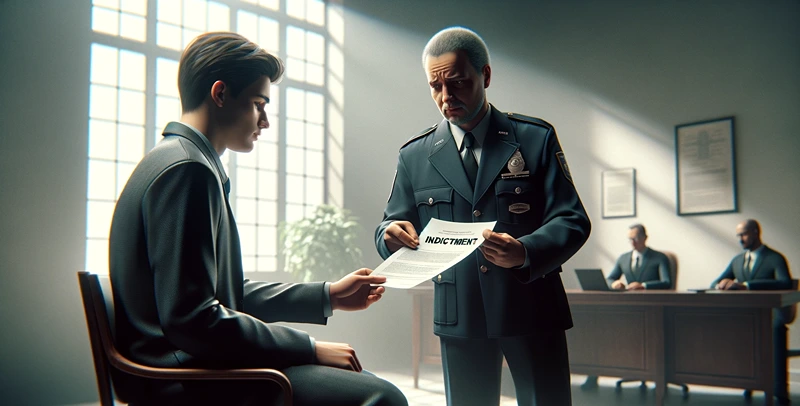
Investigative Article:
The Nine Stages of a Criminal Case in Arizona Law: A Comprehensive Look into Criminal Indictment
Being indicted in a criminal case can be nerve-racking, especially when you're uncertain about what the future holds. It's important to have a clear understanding of what happens during a criminal case, particularly if you're being indicted.
In this article, we're going to take a comprehensive look into criminal indictment in Arizona law. We'll be exploring the nine stages of a criminal case, answering questions related to indictments and charges, providing insights into grand jury proceedings, and discussing the importance of hiring a defense attorney if you're facing a criminal indictment.
What is a Criminal Indictment?
A criminal indictment is a formal accusation against an individual or individuals suspected of committing a crime. It is presented to a grand jury by a prosecutor, who attempts to convince the jury that a crime has been committed by the accused party or parties. If the grand jury agrees with the prosecutor, they will issue an indictment, a formal charging document that outlines the specific charges against the accused.
The Nine Stages of a Criminal Case
Now that we've defined what a criminal indictment is, let's move onto the nine stages of a criminal case. Understanding these stages will give you a clear idea of what to expect if you're facing criminal charges in Arizona.
Stage 1: Arrest
The first stage of a criminal case is an arrest. When you're arrested, you'll be informed of the charges against you and your rights. You'll be given an opportunity to contact a lawyer and may be placed in custody if you're considered a flight risk or a danger to society.
Stage 2: Initial Appearance
After being arrested, you'll appear in court for an initial appearance. During this stage, the judge will inform you of the charges against you, appoint an attorney if you're unable to afford one, and set bail or release conditions.
Stage 3: Preliminary Hearing
The next stage is a preliminary hearing, during which the prosecutor must establish that there is enough evidence to support the charges against you. If the judge believes there is enough probable cause, the case will move onto the next stage.
Stage 4: Grand Jury or Information
Depending on the circumstances of your case, the prosecutor may choose to proceed with a grand jury or information. A grand jury is a group of citizens who determine whether there is enough evidence to support criminal charges against you. If the grand jury returns an indictment, formal charges will be brought against you. Alternatively, the prosecutor may file an information, which is a formal accusation filed by the prosecutor that outlines the charges against you.
Stage 5: Arraignment
The next stage is the arraignment, during which you will enter a plea of guilty or not guilty. It's important to note that this stage does not determine whether you're guilty or not guilty, only whether you're admitting to the charges against you or not.
Stage 6: Pretrial Conference
During the pretrial conference, the prosecution and defense attorneys will discuss the case and attempt to resolve any legal issues before the trial begins. If the case cannot be resolved, it will proceed to trial.
Stage 7: Trial
The trial is the stage at which the prosecution and defense will present evidence, call witnesses, and make arguments to a judge or jury. The court will determine whether you're guilty or not guilty of the charges against you.
Stage 8: Sentencing
If you're found guilty, the next stage is sentencing. During this stage, the court will impose a sentence based on the severity of the crime committed, any mitigating or aggravating circumstances, and any other relevant factors.
Stage 9: Appeal
If you're found guilty and disagree with the decision, you have the right to appeal the verdict. During the appeal, the higher court will review the case to see if any errors were made during the trial.
Is an Indictment the Same Thing as Criminal Charges?
One common question people have about criminal indictments is whether they're the same as criminal charges. The answer is yes, an indictment is a formal accusation that outlines the specific criminal charges against the accused party.
Can I Be Indicted Without Being Arrested First?
It is possible to be indicted without being arrested first. In some cases, a prosecutor may present evidence to the grand jury, who may then issue an indictment without making any arrests. However, this is relatively rare and usually only occurs in cases where the accused is difficult to apprehend.
How do Grand Jury Proceedings Work?
Grand jury proceedings are conducted in secret and are presided over by a judge. The prosecutor will present evidence to the grand jury and attempt to convince them that there is enough evidence to support criminal charges against the accused. The grand jury will then vote on whether to issue an indictment or not.
Should You Hire a Defense Attorney For a Criminal Indictment?
It is highly recommended that you hire a defense attorney if you're facing a criminal indictment. A defense attorney can help you navigate the legal process, provide expert advice on how to proceed, and ensure that your rights are protected throughout the criminal case.
While being indicted in a criminal case can be scary and intimidating, understanding the process can help alleviate some of the stress. By arming yourself with knowledge, hiring an experienced defense attorney, and being proactive throughout the legal process, you can increase your chances of a positive outcome.
Criminal Indictment Arizona Law -

0 Comments